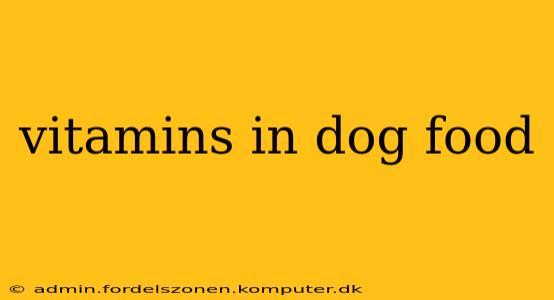Choosing the right dog food can feel overwhelming, with countless brands and formulas vying for your attention. One crucial aspect often overlooked is the vitamin content. Understanding the role of vitamins in your dog's diet is essential for ensuring their health and well-being. This comprehensive guide will delve into the importance of vitamins in dog food, exploring which are crucial, how deficiencies manifest, and how to choose a food that meets your canine companion's needs.
What Vitamins Do Dogs Need?
Dogs, like humans, require a variety of vitamins to thrive. These vitamins are broadly categorized into fat-soluble (A, D, E, and K) and water-soluble (B vitamins and C). Each plays a vital role in different bodily functions.
-
Vitamin A (Retinol): Crucial for vision, reproduction, and immune function. Deficiency can lead to night blindness, dry skin, and increased susceptibility to infections.
-
Vitamin D (Cholecalciferol): Essential for calcium absorption, bone health, and immune system regulation. A deficiency can result in weakened bones and muscle weakness. While dogs can produce some Vitamin D through sun exposure, supplemental amounts are usually needed, particularly in dogs with limited outdoor time.
-
Vitamin E (Tocopherols): A powerful antioxidant that protects cells from damage, supporting immune function and overall health. Deficiencies are rare but can lead to muscle weakness and reproductive issues.
-
Vitamin K (Phylloquinone and Menaquinones): Essential for blood clotting. Deficiencies are uncommon, but can cause excessive bleeding.
-
B Vitamins (Thiamine, Riboflavin, Niacin, Pantothenic Acid, Biotin, Pyridoxine, Folate, Cobalamin): These vitamins are crucial for metabolism, energy production, nerve function, and red blood cell formation. Deficiencies can lead to a variety of symptoms depending on the specific vitamin lacking, including lethargy, skin problems, and neurological issues.
-
Vitamin C (Ascorbic Acid): While dogs can synthesize some Vitamin C, many commercial dog foods include it as a supplementary antioxidant. It plays a role in collagen synthesis and immune function.
How Do Vitamin Deficiencies Show Up in Dogs?
Recognizing vitamin deficiencies in dogs can be challenging, as symptoms can be subtle or mimic other health problems. However, some common signs include:
-
Lethargy and fatigue: This can indicate a deficiency in several B vitamins or Vitamin D.
-
Poor coat and skin: Dry, dull fur, excessive shedding, and skin problems can be a sign of deficiencies in Vitamin A, E, or essential fatty acids.
-
Weakened bones and joints: Vitamin D deficiency is a significant contributor to bone problems in dogs.
-
Impaired vision: Vitamin A deficiency can cause night blindness.
-
Increased susceptibility to infections: Deficiencies in Vitamins A, D, and E can weaken the immune system.
-
Neurological problems: Deficiencies in B vitamins can affect nerve function.
It is crucial to note: If you suspect your dog has a vitamin deficiency, consult your veterinarian immediately. They can perform appropriate tests and provide a diagnosis and treatment plan. Never attempt to self-diagnose and treat vitamin deficiencies.
What are the Best Sources of Vitamins for Dogs?
The best source of vitamins for dogs is a high-quality, balanced commercial dog food that is formulated to meet the Association of American Feed Control Officials (AAFCO) nutrient profiles. These profiles outline the minimum daily requirements for essential nutrients, including vitamins. Always choose a food appropriate for your dog's age, breed, size, and activity level.
Can I Give My Dog Vitamin Supplements?
While a balanced diet should provide all the necessary vitamins, in some cases, your vet may recommend supplementation. This is usually done to address a specific deficiency identified through testing or to support a dog with particular health needs. Never give your dog vitamin supplements without consulting your veterinarian first. Excessive intake of certain vitamins can be toxic.
How Much Vitamin C Should a Dog Get?
The need for supplemental Vitamin C in dogs is debated. While dogs can produce their own Vitamin C, many commercial dog foods contain added Vitamin C as an antioxidant. The amount will vary depending on the specific food and your dog's individual needs; therefore, always follow the feeding guidelines on the dog food packaging. Consult your vet if you have concerns about Vitamin C levels in your dog's diet.
Are There Any Risks Associated with Vitamin Deficiency in Dogs?
Untreated vitamin deficiencies can have serious long-term health consequences, impacting various body systems and potentially reducing your dog's lifespan. Regular veterinary check-ups and a balanced diet are critical to prevent these deficiencies.
Conclusion: Nourishing Your Canine Companion
Providing your dog with a balanced diet rich in essential vitamins is paramount for maintaining their health and longevity. By understanding the role of vitamins in canine nutrition, choosing a high-quality dog food, and consulting your veterinarian when necessary, you can ensure your furry friend receives the nourishment they need to live a long and happy life. Remember, always consult your veterinarian for personalized advice regarding your dog's dietary needs.
